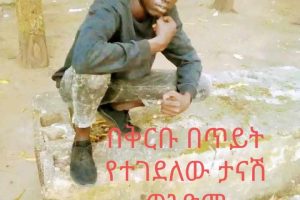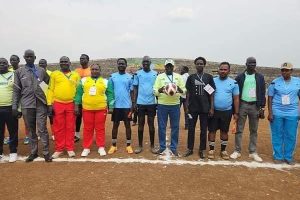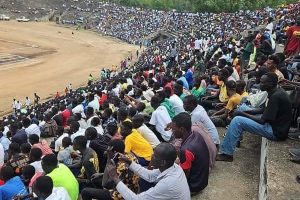By Deng Nyayul
South Sudan’s National Security Service (NSS) released former Juba City mayor Kalisto Lado, who had been detained arbitrarily for more than six months.  The release came as an assurance following two days of the social media rumors circulation campaign that indicates Kalisto had died in NSS jail in Juba. The rumors suggested that the former Juba mayor died while being denied treatment by the NSS.
The release came as an assurance following two days of the social media rumors circulation campaign that indicates Kalisto had died in NSS jail in Juba. The rumors suggested that the former Juba mayor died while being denied treatment by the NSS.
 The release came as an assurance following two days of the social media rumors circulation campaign that indicates Kalisto had died in NSS jail in Juba. The rumors suggested that the former Juba mayor died while being denied treatment by the NSS.
The release came as an assurance following two days of the social media rumors circulation campaign that indicates Kalisto had died in NSS jail in Juba. The rumors suggested that the former Juba mayor died while being denied treatment by the NSS.The influential outspoken former major politician, was arrested by the NSS on March 30, 2024 following the speech he gave during a funeral service in Juba, where he decried land-grabbing practices in Central Equatoria State. He also appealed to Equatorians to fight for their rights and speak out against what he termed as an injustice committed to them by South Sudan’s government.
These words were the reason for his detention. However, his arbitration detention is not the first of its kind. Many South Sudanese politicians, journalists and ordinary citizens had multiple times been illegally detained under minor offenses.
For example, Joseph Bangasi Bakosoro, former governor of Western Equatoria state in South Sudan, was detained by the National Security Service (NSS) on 22 December 2015. His detention has been linked with the Arrow Boys, an armed local defence force originally formed to protect local communities from attacks by the Lord’s Resistance Army.
In developed governments, arrest warrant is a court-issued document that authorizes the police to detain someone accused of a crime. Individuals cannot just be detained and jailed. But this is not the case in South Sudan, people are illegally detained without arrest warrants issued by the courts.
The National Security Service, particularly its Internal Security Bureau (ISB), is always accused by citizens for growth of human rights abuses and illegal arbitrary detentions.
The Southern Sudan Police Service Act provides for the establishment of the Police Service to prevent, combat and investigate crime, maintain law and public order, protect the people in Southern Sudan and their properties, had been taken over by the National security.
National security is kidnapping, arbitrary arrests, torture, forced disappearances, and summary executed individuals at facilities in Juba and elsewhere in the country.
In this regard, parliament needs to revisit National security bill. The law makers should revise the pending National Security Service Amendment Bill to bring an end to the agency’s arbitrary arrests and other abusive practices. The current National Security Service bill sitting on the table of South Sudan National Legislative Assembly sought to give the NSS extensive and broad powers of arrest, detention and seizure without adequate safeguards against abuse.
Although President Salva Kiir Mayardit and First Vice President Riek Machar had agreed in late February last year to remove sections 54 and 55 of the NSS Act, which gave the agency the power of arrest without a warrant, yet, nothing is being done.
Laws are just written and not respected. For instance, Article 24 of the 2011 Constitution of South Sudan states that “all citizens have the right to freedom of expression and also guarantees freedom of the press and other media at all levels of government,” yet, freedom of expression is not fully accessible in South Sudan. The government and its agents have frequently violated these rights in the name of national security. Some examples of these violations include taken Journalists equipment by the government authorities forcefully.
The NSS has used its powers to intimidate, detain, and murder journalists, opposition activists, civil society representatives, and members of faith-based organizations. Freedom of expression matters in South Sudan, not as an abstract principle, but as an essential condition for forming a permanent government which grants Civil liberties and freedoms.
Freedom of speech is the right to express ideas and opinions without government interference, retaliation, or punishment. It includes the right to speak, write, and share ideas, as well as symbolic speech, such as what a person wears, reads, performs, or protests.
Finally, the release of the former major of Juba city Kalisto Kafo on Friday September 6, 2024 by South Sudan’s National Security Service came as the result of a social media campaign following the rumors of the death of Kalisto. Since Wednesday this week, numerous social media platforms were occupied with messages circulating rumors death of Kalisto.
This forced (NSS) to release him without charges. In reality, South Sudan is in danger given National security kidnapping, arbitrary arrests, torture, forced disappearances, and summary execution of individuals at facilities in Juba and elsewhere in the country. In this regard, parliament needs to revisit the National security bill. The law makers should revise the pending National Security Service Amendment Bill to bring an end to the agency’s arbitrary arrests and other abusive practices.
Respectively,
Deng Nyayul







